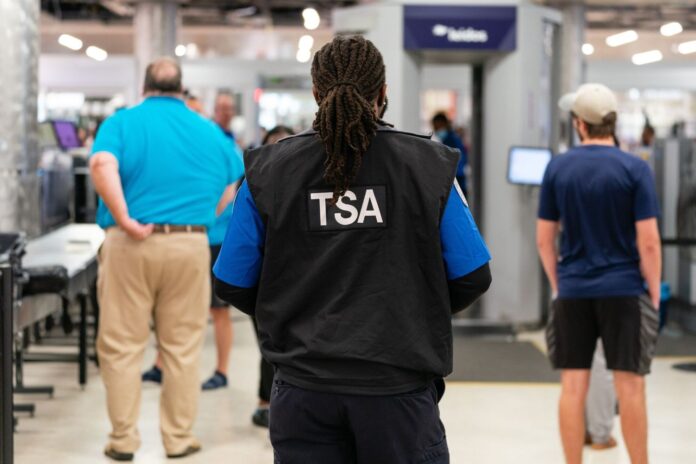:max_bytes(150000):strip_icc():format(jpeg)/TAL-tsa-agent-TSATAKENITEMS1024-fe8d039a4216476697a3c4994b3838c4.jpg)
It happens to everyone: After carefully packing your carry-on bag, you get to the airport, head to security, and your bag gets flagged going through the X-ray machine. The Transportation Security Administration (TSA) officer looks through your bag and finds a prohibited item you didn’t realize you had packed. Now, you’re left with a choice — abandon the item or figure out how to store it or send it to your destination.
If you’ve ever wondered what happens once you leave the security line, here’s everything you need to know. I spoke with Shivam Chopra, transportation security manager at Seattle-Tacoma International Airport (SEA), and Lorie Dankers, a spokesperson for the TSA, to learn all about prohibited items — and what happens to the things you leave behind.
What to Know About Prohibited Items
If you want to prevent your expensive face wash, sentimental pocket knife, or one-of-a-kind jam from being thrown out, the best thing you can do is be aware of the rules. If you’re unclear whether an item is prohibited, TSA makes it incredibly easy to find out. You can download the MyTSA app and use the “What Can I Bring?” feature, snap a picture of an item and send it to @AskTSA on X or Facebook Messenger, or send a question by texting “Travel” to AskTSA (275-872).
If you’re in doubt, it’s best to put it in your checked bag or leave it at home to avoid any hassle. On average, the Seattle-Tacoma airport collects around 1,200 pounds of metals and 2,200 pounds of liquids monthly. Considering that’s just one airport in the country, you can imagine the immense amount of avoidable waste from prohibited items. To make it easier on yourself, fellow passengers, airport employees, and the environment, double-check your belongings against the prohibited items list before heading to the airport.
vm/Getty Images
What Happens to Prohibited Items
Once the item is turned over by the passenger, it’s disposed of properly. Metal items, like multi-tools, knives, and other non-liquids, are placed in a locked bin before being sent to a state surplus store. That agency then handles those items accordingly and, in some cases, will auction them off.
Liquids, gels, and aerosols are thrown away. They cannot be reused or donated because they pose a safety concern. There’s simply no way to tell whether the item is what it says on the label without testing every product. Out of an abundance of caution, these items are considered hazardous waste and are disposed of properly. All prohibited items are collected and weighed before disposal.
TSA agents are happy to work with you if you accidentally bring a prohibited item through the security screening. If you’re parked at the airport, you can exit security and put the item in your car (if you have time before your flight). If you need the item at your final destination, you can opt to check your bag and go back through security. “We always give those three options: Go check it in with the airline, store it (in your car, with a friend, or at the airport), or abandon the item,” explains Chopra.
If you don’t have time to check or store the item but it’s of sentimental value, select airports offer to mail small items to your home address for a fee. Larger airports will have a dedicated kiosk, while smaller airports might offer this service through gift shops. However, the best option is to avoid having the item confiscated in the first place.
As Dankers noted, “We don’t make the rules; we’re just in charge of enforcing them.” This means officers can’t bend the rules, no matter how much you might plead your case. The priority is ensuring the safety of all passengers.
Commonly Confiscated Items
Unsurprisingly, the most commonly confiscated items are liquids. “Some of the most common ones we get are bottles of water, shaving creams, and liquids that are for personal use,” says Chopra. This happens all day, every day, at airports across the country. Some passengers forget they put liquids in their bags from their hotel room, while others might not understand the 3.4-ounce rule.
The other most common items are pocket knives, multi-tools, and pepper spray. You might carry these items with you every day and not even realize you have them on you. They might be on your keychain or tucked away in a backpack out of sight. However, if pepper spray were to deploy accidentally on a plane, it would pose a health risk for all passengers on board. If you like traveling with safety tools, it might be better to purchase them at your destination or pack them in a checked bag if it’s allowed.
Other common prohibited items depend on the location. For instance, the Seattle-Tacoma airport sees a lot of sporting goods and hiking equipment, such as hiking sticks, baseball bats, and golf clubs. These items could be used as weapons on a plane, so they aren’t allowed on board.
The caveat to this is if the item is medically necessary. For instance, if someone uses a walking stick as a mobility device to steady themselves, it’s allowed on board. Similarly, if you have medically necessary liquids like baby formula or prescriptions, you can bring those items through. Note that they will have to be tested, so give yourself a little extra time to get through security.
Bottom Line
Even though you know your hand cream and toothpaste don’t pose a security threat, there isn’t a feasible way for the TSA to ensure these items are what they say they are. To keep all passengers safe, the 3-1-1 liquids rule is strictly enforced, and other prohibited items must be surrendered prior to exiting security. Before going to the airport, carefully look at your bags to be sure a prohibited item isn’t packed by mistake.



